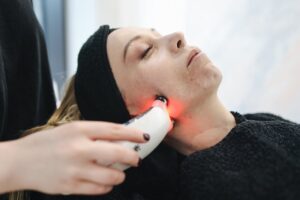 Dermatological Care and Dermatology Nurse Practitioners (DNPs) are playing an increasingly crucial role in healthcare, particularly in the management and treatment of skin conditions. With their extensive training and specialized knowledge, DNPs are well-equipped to offer a range of advanced dermatological treatments that go beyond basic care. These professionals are pivotal in diagnosing, managing, and treating an array of skin diseases with a precision that enhances patient outcomes significantly. As they integrate new technologies and methodologies into their practices, DNPs not only improve the quality of care but also contribute to the broader understanding of dermatological care conditions.
Dermatological Care and Dermatology Nurse Practitioners (DNPs) are playing an increasingly crucial role in healthcare, particularly in the management and treatment of skin conditions. With their extensive training and specialized knowledge, DNPs are well-equipped to offer a range of advanced dermatological treatments that go beyond basic care. These professionals are pivotal in diagnosing, managing, and treating an array of skin diseases with a precision that enhances patient outcomes significantly. As they integrate new technologies and methodologies into their practices, DNPs not only improve the quality of care but also contribute to the broader understanding of dermatological care conditions.
The scope of services provided by DNPs includes everything from routine skin checks to complex procedures such as laser therapy and biopsies. Their expertise allows for the early detection of serious conditions like melanoma, ensuring timely and potentially lifesaving interventions. Moreover, their approach to patient care is holistic; they consider the physical as well as psychological aspects of skin conditions, which is essential for comprehensive treatment planning.
Furthermore, DNPs are educators and advocates for their patients. They spend considerable time discussing preventive measures, treatment options, and skincare routines. This educational role is vital in dermatology, where understanding the factors that affect skin health can lead to better patient compliance and ultimately better outcomes. As such, DNPs are not just care providers but also educators and patient advocates in the field of dermatology.
Table of Contents
Innovations in Diagnostic Techniques for Dermatological Care
The field of dermatology has seen significant advancements in diagnostic technologies, largely due to the contributions of DNPs. Techniques such as digital dermatoscopy and confocal microscopy have revolutionized the way skin conditions are diagnosed, allowing DNPs to detect diseases at their earliest stages. Digital dermoscopy, for example, enables the detailed examination of moles and other skin lesions, significantly improving the accuracy of melanoma detection.
Confocal microscopy offers a non-invasive peek into the cellular structure of the skin, providing critical data that can lead to the early identification of basal cell carcinoma and other skin pathologies. This technique reduces the need for invasive biopsies and allows for immediate therapeutic decisions, enhancing both the treatment process and the patient experience.
Photodynamic therapy (PDT) exemplifies another diagnostic and treatment method utilized by DNPs. This approach targets precancerous and cancerous cells with light-sensitive compounds, illuminating areas of concern during the diagnostic phase and effectively treating them during the therapeutic phase. PDT is a testament to the dual roles many modern dermatological care treatments possess, blurring the lines between diagnosis and therapy for improved patient outcomes.
Advanced Treatment Modalities for Dermatological Care
DNPs are skilled in employing advanced dermatological care, pharmacotherapies and biologic treatments that target the underlying causes of skin diseases. These treatments, particularly biologics, have transformed the management of chronic conditions such as psoriasis and eczema. Biologics specifically target immune system components that drive inflammation, offering relief to patients with severe symptoms and providing a quality of life that was previously unattainable.
In addition to pharmacological treatments, DNPs are adept at procedural dermatology, which includes techniques like laser therapy and minor surgical interventions. These procedures are crucial for both the effective treatment of skin diseases and aesthetic improvements, thereby addressing both health and cosmetic concerns. Mastery of these techniques requires an in-depth understanding of skin physiology and technological proficiency.
Moreover, DNPs are integral in managing the treatment regimens of their patients, ensuring that each therapeutic approach is tailored to individual needs. This personalized care strategy is vital for effective treatment outcomes and patient satisfaction, emphasizing the DNP’s role as a pivotal figure in patient-centric care.
Collaborating Dermatological Care Efforts for Advanced Practice
 In an effort to continue their professional development and refine their practical skills, many DNPs seek opportunities to collaborate with experienced physicians. This pursuit of enhanced clinical experience is crucial for DNPs aiming to deepen their expertise, particularly in specialized fields like dermatology. Organizations like Collaborating Docs play a pivotal role by connecting dermatology nurse practitioners and other NP and physician assistant (PA) professionals with seasoned doctors to help them establish their own businesses. This partnership not only broadens the DNPs’ treatment capabilities but also improves patient outcomes by integrating comprehensive, informed, and experienced care practices.
In an effort to continue their professional development and refine their practical skills, many DNPs seek opportunities to collaborate with experienced physicians. This pursuit of enhanced clinical experience is crucial for DNPs aiming to deepen their expertise, particularly in specialized fields like dermatology. Organizations like Collaborating Docs play a pivotal role by connecting dermatology nurse practitioners and other NP and physician assistant (PA) professionals with seasoned doctors to help them establish their own businesses. This partnership not only broadens the DNPs’ treatment capabilities but also improves patient outcomes by integrating comprehensive, informed, and experienced care practices.
Such collaborations are beneficial for both NPs and the healthcare system at large, as they help bridge the gap between theoretical knowledge and hands-on clinical practice. The support from these partnerships allows DNPs to undertake more complex procedures and treatments under the guidance of experienced mentors, enhancing their confidence and skills. Moreover, these experiences prepare DNPs to handle a broader range of cases independently in the future, contributing to a more robust healthcare workforce.
These collaborative efforts also underscore the importance of ongoing professional development in maintaining high standards of patient care. As DNPs continue to evolve with the field, staying updated with the latest treatments and technologies, their role in advancing dermatological care becomes increasingly significant. This continuous learning and adaptation are what allow DNPs to remain at the forefront of the field, ensuring they provide the best possible outcomes for their patients.
The Role of DNPs in Pediatric and Geriatric Dermatological Care
Treating skin conditions in diverse age groups, such as children and the elderly, presents unique challenges that DNPs are particularly well-equipped to handle. Pediatric dermatological care requires a gentle approach tailored to the sensitive skin and specific needs of children. DNPs not only treat common conditions like diaper rash and eczema but also educate parents on long-term skin care management, which is crucial for the child's overall health and well-being.
In geriatric dermatological care, DNPs address the complexities associated with aging skin, which is prone to xerosis, tears, and various dermatoses. Their treatment plans are designed to minimize discomfort and enhance the skin's integrity. This involves a thorough understanding of how aging affects skin health and the careful selection of therapies that are effective yet gentle enough for delicate skin.
The educational role of DNPs extends into geriatric care as well. They provide guidance on maintaining skin health in older adults, discussing how to manage chronic conditions and prevent complications. This educational outreach is critical, as it empowers patients to take an active role in managing their health, which can significantly improve their quality of life.
Emergency Dermatological Care
In emergency dermatological care situations, DNPs are often the first responders. Their ability to quickly assess and manage acute reactions is critical in preventing severe outcomes. This includes identifying and treating potentially life-threatening conditions such as Stevens-Johnson syndrome or necrotizing fasciitis, where immediate intervention is essential. DNPs’ training enables them to perform necessary emergency procedures and make rapid clinical decisions that can save lives and reduce long-term complications.
Their role in emergency care also involves a deep understanding of dermatopathology, allowing them to distinguish between similar-looking eruptions and reactions, which can be pivotal in crisis situations. This expertise is crucial, not just for accurate diagnosis but also for determining the most effective treatment paths in a time-sensitive environment. Thus, DNPs are indispensable in emergency settings, combining their diagnostic acumen with procedural skills to manage acute dermatological care crises.
Furthermore, DNPs collaborate closely with other healthcare professionals in emergencies, ensuring that comprehensive care is provided. This multidisciplinary approach is essential in complex cases where multiple organ systems might be involved. By working alongside emergency medicine doctors, dermatologists, and other specialists, DNPs ensure that patients receive holistic and expedient care during critical dermatological care moments.
Final Thoughts: The Future of Dermatology Care
As the field of dermatology continues to advance, DNPs are uniquely positioned to play a leading role in shaping its future. Their ability to integrate new research findings and technologies into clinical practice is vital for the continued evolution of skin care treatments. Furthermore, DNPs contribute significantly to the body of dermatological care knowledge through their involvement in clinical trials and research studies, pushing the boundaries of what is possible in dermatological care.
The future of dermatology care looks promising thanks to the contributions of DNPs, who ensure that patient care keeps pace with technological and pharmacological advancements. Their dedication to education, patient advocacy, and professional excellence not only enhances the quality of care provided but also ensures that dermatology continues to evolve as a patient-centered discipline.
Ultimately, the journey of DNPs in dermatological care is characterized by a commitment to lifelong learning, patient empowerment, and clinical excellence. This dedication ensures that they remain leaders in providing exceptional care and shaping the future of healthcare. As DNPs continue to advance in their roles, their impact on the lives of patients and the broader healthcare landscape will undoubtedly continue to grow, marking a new era of innovation and compassionate care in dermatological care.









